Cesium Releases in September 2024
In August, we explained more about the Cesium Certified Developer process, highlighted Cesium ion Self-Hosted updates, shed light on Cesium ion architecture (parts 1 and 2), launched Cesium Moon Terrain, did a deep dive into our GitHub Actions workflow, explored 3D models of early civilizations with UNICiv, and shared our SIGGRAPH trip report.
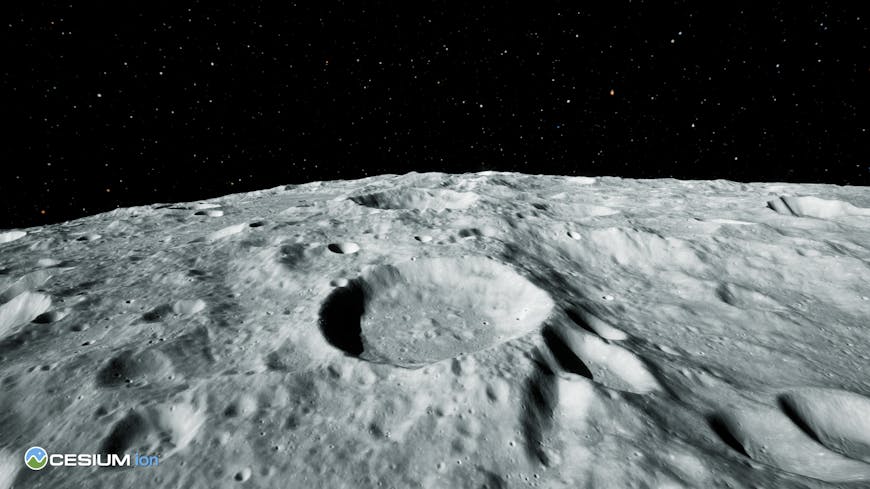
Add Cesium Moon Terrain to your Asset Library from the Cesium ion Asset Depot.
We made improvements across Cesium this month. To get notifications about our monthly releases, you can subscribe to the Cesium release roundup thread on our community forum.
CesiumJS 1.121 Release
CesiumJS 1.121 is now available. Highlights of the release include:
- Enable MSAA by default with 4 samples. This smooths jagged edges for increased visual realism. #12158
- Switched the default (non-HDR) tonemapping for models, atmosphere, and globe from ACES to PBR Neutral Tonemap from Khronos. This widens the gamut of possible colors and provides more consistent color appearances across renderers. #12160
- Expose the
tonemapperandexposureproperties ofPostProcessStageCollectionto allow changing the tonemap used when HDR is turned on. This defaults to the PBR Neutral Tonemap from Khronos. #12160 - Added
WaterMaskglobe material, which visualizes areas of water or land based on the terrain's water mask. #12149 - Fixed several bugs with PBR lighting for more realistic rendering. #12100, #12116, and #12118
For more details, see the changelog.
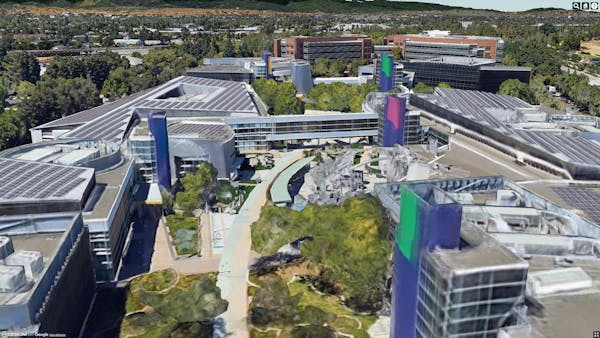
Googleplex, Mountain View, California, USA, as Google Photorealistic 3D Tiles without HDR or MSAA.
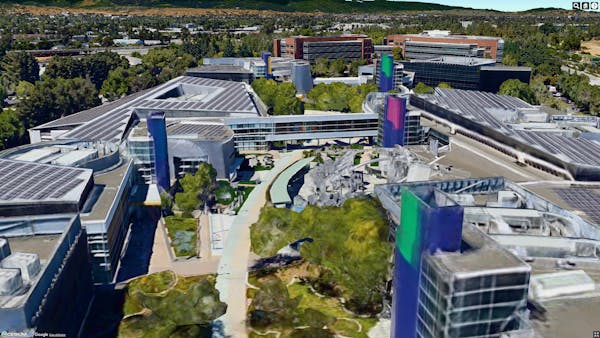
Googleplex, Mountain View, California, USA, as Google Photorealistic 3D Tiles with HDR and MSAA on.
Cesium for Unreal 2.8.0 Release
Cesium for Unreal v2.8.0 is now available. Highlights of the release include:
- Added universal (Intel and Apple Silicon) binaries for Unreal Engine 5.2. Unreal Engine 5.3 and 5.4 already had universal binaries.
- Raster overlays now have
bAllowAnyoneToDestroyMeset to true by default. This allows them to be dynamically removed and destroyed at runtime via the BlueprintDestroy Componentfunction called from anywhere, including Level Blueprints. Previously, attempting to delete a raster overlay from outside the Actor would result in an error. - Fixed a bug introduced in the previous release that caused instanced tilesets to render incorrectly.
- Debug sections are no longer compressed on Linux and Android, improving compatibility.
- Fixed a bug where calling
Refreshon aCesiumRasterOverlaywould cause the overlay to appear on the Cesium3DTileset, even if inactive.
Check the Cesium for Unreal release and the Cesium for Unreal Samples release for the full list of updates.
Cesium for Unity 1.12.0 Release
Cesium for Unity v1.12.0 is now available. Highlights of this release include:
- Editor and Player builds both now require macOS 10.15+. Previously, 10.13 was supported for Players, and 12.7+ was required for the Editor.
- Added
originPlacementproperty toCesiumGeoreferenceto toggle between "Cartographic Origin" and "True Origin" reference modes. Whereas "Cartographic Origin" is the default for georeferenced tilesets, "True Origin" may be used for non-georeferenced tilesets centered at the origin. - Fixed a bug that prevented using the Token panel with a new Cesium ion Server that had never had its token set before.
- Fixed a bug that could cause a crash in
CesiumIonSessionwhen the object was garbage collected or the AppDomain was unloaded while network requests were in progress. - Fixed a bug that could cause
CesiumFlyToControllerto unexpectedly interrupt a flight. - Fixed a bug that prevented clipping with CesiumCartographicPolygon from working with HDRP.
Check the Cesium for Unity changelog for the full list of updates, and follow our Cesium for Unity tutorials to get started.
Cesium for Omniverse 0.22.0 Release
Cesium for Omniverse v0.22.0 is available.
The extension now supports using non-WGS84 ellipsoids. A CesiumEllipsoidPrim should be specified on the ellipsoidBinding field of a CesiumReferencePrim.
Peruse the changelog for the full list of updates, and get started with our Cesium for Omniverse tutorials.
Cesium ion Updates
- Yesterday we announced a new Design Tiler and Revit Add-In, available for early access and feedback via our AECO Tech Preview Program. These tools transform IFC and Revit files into 3D Tiles. Read more here.
- Cesium Moon Terrain, the first readily accessible single, comprehensive 3D Tileset of the Moon, is now available. More details are on our blog.
- You can link directly to a specific slide in Cesium Stories. The viewer and editor URLs include hash references to each slide’s ID, so they remember exactly which slide you’re on. See the forum post for more info.
- Create copies of your existing Cesium Stories or individual slides, to use your current content instead of starting from scratch. This forum post has details.
Check the changelogs for the full list of updates for Cesium ion SaaS and Cesium ion Self-Hosted.
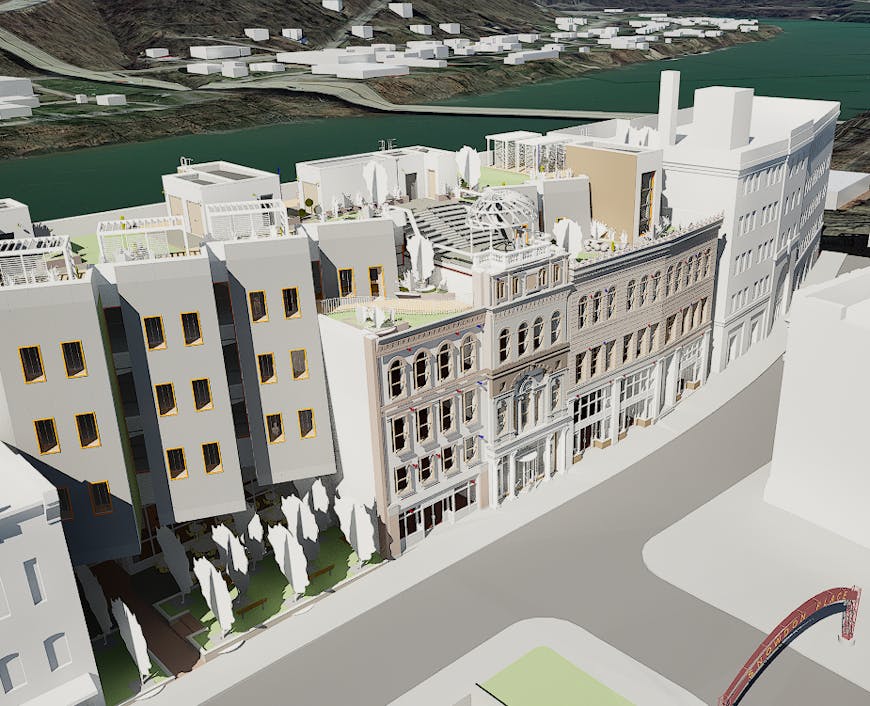
Autodesk Snowdon Towers sample data exported directly from Revit as 3D Tiles including structural and MEP content, full interior detail, and per-feature metadata streamed into Unreal with Cesium. Data courtesy of Autodesk.
Powered by Cesium
The Lockheed Martin AI Center’s (LAIC) Joint Activity Manager (JAM) provides operational context for active wildland fires, using AI, real-time data, and CesiumJS to stream this 3D visualization to incident commanders. While still in development, this capability is intended for state agencies to visualize and analyze active wildland fires; track flights of aerial assets that have been tasked with detection, monitoring, and suppression; and incorporate weather information, such as temperature, humidity, and wind.
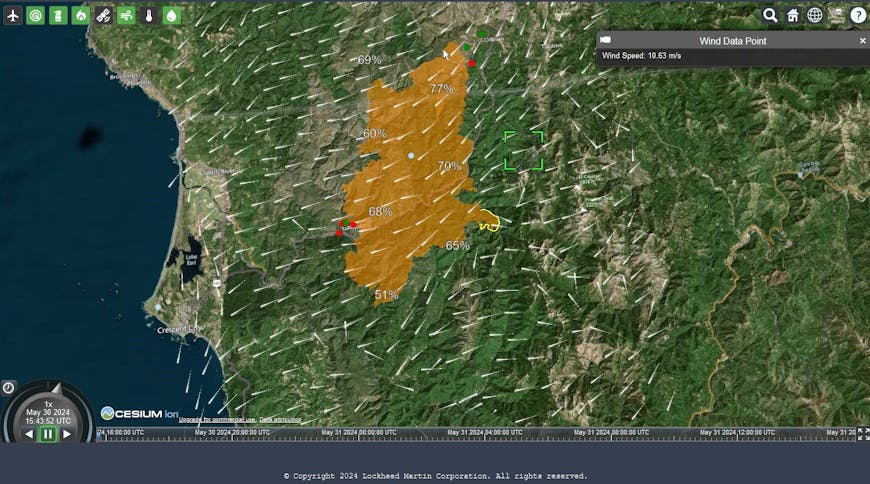
Wind and weather information for an active fire area in CesiumJS. Courtesy Lockheed Martin.